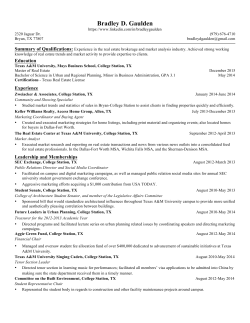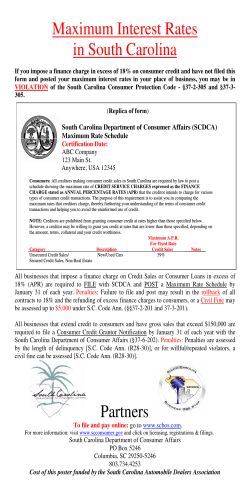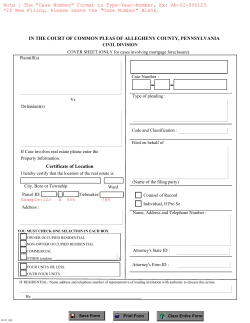
Form A-101 - NC Department of Revenue
Estate Tax Return A-101 Web-Fill 10-13 North Carolina Department of Revenue 4 ✖ PRINT CLEAR (For deaths occurring on or after January 1, 2011 and before January 1, 2013) Decedent’s First Name (USE CAPITAL LETTERS FOR NAME AND ADDRESS) Decedent’s SSN M.I. Last Name Date of Death (MM-DD-YY) Was the decedent a resident of North Carolina? Yes M.I. (Enter first five letters) No Court Appointed: Yes No Last Name Personal Representative’s SSN Apartment Number Address City State Zip Code Fill in circle and complete information below if the closing certificate should be mailed to a person other than the personal representative. First Name Amended Return Personal Representative’s Federal Employer ID Number (If applicable) Personal Representative’s Legal Name (If applicable) Personal Representative’s First Name If yes, enter county of residence M.I. Telephone Attorney or Accountant Last Name Apartment Number Address City State Zip Code Telephone Fill in applicable circles: A federal extension of 6 months was requested for filing the federal estate return A federal extension exceeding 6 months was requested for filing the federal estate return due to the personal representative being out of the country A federal extension was requested for paying the estate tax due under IRC Section 6161 You elect installment payments in the same manner as elected for federal estate tax payments under IRC section 6166 Estate Tax Computation (Complete Lines 1 through 21) 1. Total gross estate (From Federal Form 706, Page 1, Line 1) 1. 2. Allowable deductions (From Federal Form 706, Page 1, Line 2) 2. 3. Taxable estate (before state death tax deduction) (Line 1 minus Line 2) 3. 4. Adjusted taxable gifts (From Federal Form 706, Page 1, Line 4) 4. 5. Add Lines 3 and 4 5. 6. Compute tax on amount on Line 5 using Table A-Unified Rate Schedule in Federal Form 706 Instructions 6. 7. Total federal gift tax payable (From Federal Form 706, Page 1, Line 7) 7. 8. Line 6 minus Line 7 8. 9. Allowable applicable credit amount (From Federal Form 706, Page 1, Line 11) 9. 10. Line 8 minus Line 9 (Do not enter less than zero) 10. 11. Enter the amount from Line 3 11. 12. Less adjustment to taxable estate 12. 60000.00 Page 2 Decedent’s Social Security Number Decedent’s Last Name A-101 Web-Fill 10-13 13. Adjusted taxable estate (Line 11 minus Line 12, do not enter less than zero) 13. 14. Compute tax on amount on Line 13 using the State Death Tax Credit Table on Page 3 14. 15. Enter the lesser of lines 10 or 14 (Important: If decedent was a North Carolina resident and all property was located in North Carolina, enter amount on this line on line 16 below. Otherwise, complete the applicable computation below to determine the North Carolina estate tax to enter on line 16.) 15. 16. North Carolina estate tax 16. 17. Prior payments. Explain in an attached statement. 17. 18. North Carolina estate tax due (Line 16 minus Line 17) 18. 19. Penalty 19. 20. Interest 20. 21. Total tax, penalty, and interest (Add Lines 18, 19, and 20) Pay this amount 21. The computations below determine the estate tax due for resident decedents who owned property outside of North Carolina and for nonresident decedents who owned property inside North Carolina. You must complete the fields below to determine the amount to enter on Line 16. If the decedent owned real property in another state or was a nonresident, you must attach a complete copy of Federal Form 706 to this return. Computation for North Carolina Resident Decedent with Property Outside of North Carolina 22. Enter the gross value of property included on Line 1 that has a tax situs in another state 22. 23. Divide Line 22 by the amount of the total gross estate (From Line 1) 23. 24. Enter the amount from Line 15 24. 25. Multiply the amount on Line 24 by the decimal amount on Line 23 25. 26. Subtract Line 25 from Line 24 (Enter result here and on Line 16) 26. (Enter result as a decimal amount rounded to four decimal places) Computation for Nonresident Decedent with Property Inside North Carolina 27. Enter the gross value of real property included on Line 1 that is located in North Carolina plus the gross value of personal property included in Line 1 that has a tax situs in North Carolina 27. 28. Divide Line 27 by the amount of the total gross estate (From Line 1) 28. 29. Multiply the amount on Line 15 by the decimal amount on Line 28 29. (Enter the result as decimal amount rounded to four decimal places) (Enter the result here and on Line 16) List all NC counties in which decedent owned real estate (Enter first five letters): County County County County County County County County Fill in circle if additional counties and attach list of counties. Page 3 Decedent’s Social Security Number Decedent’s Last Name A-101 Web-Fill 10-13 Signature - I authorize each person shown on page 1 to receive and inspect confidential tax information regarding the estate of this decedent. I certify that, to the best of my knowledge, this return is accurate and complete. If prepared by a person other than the personal representative, this certification is based on all information of which the preparer has any knowledge. Representative’s Signature Date Preparer’s Signature Date Print Name of Preparer Preparer’s Telephone Use the State Death Tax Credit Table below to determine the amount to enter on Page 2, Line 14. State Death Tax Credit Table (1) (2) Adjusted Taxable Estate Equal to or more than less than 0 $40,000 90,000 140,000 240,000 440,000 640,000 840,000 1,040,000 1,540,000 $40,000 90,000 140,000 240,000 440,000 640,000 840,000 1,040,000 1,540,000 2,040,000 (3) (4) Tax on amount in column (1) Rate of tax on excess over amount in column (1) 0 0 $400 1,200 3,600 10,000 18,000 27,600 38,800 70,800 None 0.8% 1.6% 2.4% 3.2% 4.0% 4.8% 5.6% 6.4% 7.2% (1) (2) (3) Tax on amount in column (1) Adjusted Taxable Estate Equal to or more than less than 2,040,000 2,540,000 3,040,000 3,540,000 4,040,000 5,040,000 6,040,000 7,040,000 8,040,000 9,040,000 10,040,000 2,540,000 3,040,000 3,540,000 4,040,000 5,040,000 6,040,000 7,040,000 8,040,000 9,040,000 10,040,000 ----------- (4) Rate of tax on excess over amount in column (1) 106,800 146,800 190,800 238,800 290,800 402,800 522,800 650,800 786,800 930,800 1,082,800 8.0% 8.8% 9.6% 10.4% 11.2% 12.0% 12.8% 13.6% 14.4% 15.2% 16.0% General Instructions for North Carolina Estate Tax Return North Carolina Department of Revenue North Carolina Estate Tax Background: For decedents dying on or after January 1, 2005, and before January 1, 2010, North Carolina estate tax is due on the estate when a federal estate tax would be payable if the federal estate tax was determined without regard to the deduction for state death taxes. The North Carolina estate tax is equal to the state death tax credit that was allowable under section 2011 of the Internal Revenue Code as it existed prior to 2002. The tax is calculated using the State Death Tax Credit Table shown above. The amount of the North Carolina estate tax is limited to the federal estate tax that would be payable if the federal estate tax was computed without regard to the deduction for state death taxes. Current Law: The North Carolina estate tax is reinstated effective for those decedents dying on or after January 1, 2011, if a federal estate tax return is required. The 2010 Tax Relief Act, which became law December 17, 2010, reinstates the federal estate tax retroactively to January 1, 2010. For decedents dying in 2011, the federal law gives estates the option to elect to apply the estate tax based on a maximum estate tax rate of 35 percent and an exclusion of $5,000,000 (the portability provision provides an exclusion amount of $10,000,000 for married couples) with a stepped-up basis, or pay no estate tax and receive a modified carryover basis in the property passing through the estate. The applicable exclusion amount for estates of decedents dying in 2012 is $5,120,000. Although there is no North Carolina estate tax return filed for those who died during 2010, North Carolina law conforms to the exclusion amounts and the stepped-up basis for estates that chose to pay federal estate tax. Page 4 A-101 Web-Fill 10-13 General Instructions for North Carolina Estate Tax Return (continued) North Carolina Department of Revenue Filing Requirement -- A North Carolina Estate Tax Return (Form A-101) is required to be filed by the personal representative if a federal estate tax return (Form 706) is required to be filed with the Internal Revenue Service and the decedent was domiciled in North Carolina at death or the decedent owned real property or tangible personal property located in North Carolina. If the decedent was domiciled in North Carolina and all property is located in North Carolina, include copies of pages 1, 2, and 3 of Federal Form 706. If decedent owned property outside of North Carolina or was not domiciled in North Carolina, include a complete copy of Federal Form 706. When and Where to File -- A North Carolina Estate Tax Return must be filed with the North Carolina Department of Revenue at the same time the federal estate tax return is due which is nine months from the date of death. Form A-101 should be mailed to the North Carolina Department of Revenue, Post Office Box 25000, Raleigh, North Carolina 27640-0100. IMPORTANT: Copies of pages 1, 2, and 3 of Federal Form 706 must be attached to this return. If the decedent owned real property in another state or was not domiciled in North Carolina, you must attach a complete copy of Federal Form 706 to this return. Paying the Tax -- Payment should include the tax plus any applicable penalties and interest. Include the name of the estate on the payment. Attach payment to the return and mail to the above address. If a federal extension was requested for paying the estate tax due under IRC Section 6161, attach supporting documentation of the IRS acceptance of the election and fill in the applicable circle on page 1. The personal representative may elect to make installment payments of North Carolina estate tax in the same manner as elected for federal estate tax payments under section 6166 of the Internal Revenue Code. Acceleration of the federal payments also accelerates the State payments. If the personal representative elects the same North Carolina installment payments, attach supporting documentation of the IRS acceptance of the election and fill in the applicable circle on page 1. The personal representative is liable for the estate tax that is not paid within two years after it was due. This liability is limited to the value of estate assets under the representative’s control. Penalties and Interest -- If the return is not filed by the due date, a late filing penalty of five percent of the tax (maximum 25 percent) is due for each month, or part of a month, the return is late. If the full amount of tax is not paid by the due date, a late payment penalty of ten percent of the unpaid tax is due. Interest accrues from the original due date and continues to accrue until the tax is paid. Contact the Department of Revenue for the current interest rate. Extensions -- If the North Carolina Estate Tax Return cannot be filed by the due date, an extension of time for filing the return and paying the tax may be granted. A request for an extension must be submitted in writing to the Department (at the above address) on or before the due date of the return. In lieu of requesting an extension, fill in the applicable circle on page 1 of Form A-101 if a federal extension was granted. Interest will accrue on any estate tax not paid by the original due date of the return. Uniform Valuation -- The personal representative is required to file a copy of the Federal Estate Tax Closing Letter with the Department within six months of receipt. If changes are made to the federal estate tax return by the Internal Revenue Service, the personal representative must report the changes to the State by filing an amended North Carolina Estate Tax Return with a copy of the federal changes. If the amended return and payment of any additional tax due is not received by the Department within six months of receipt of the report of federal changes, a penalty of five percent of the additional tax for each month or part of a month that the return is late (maximum 25 percent) is due.
© Copyright 2025









